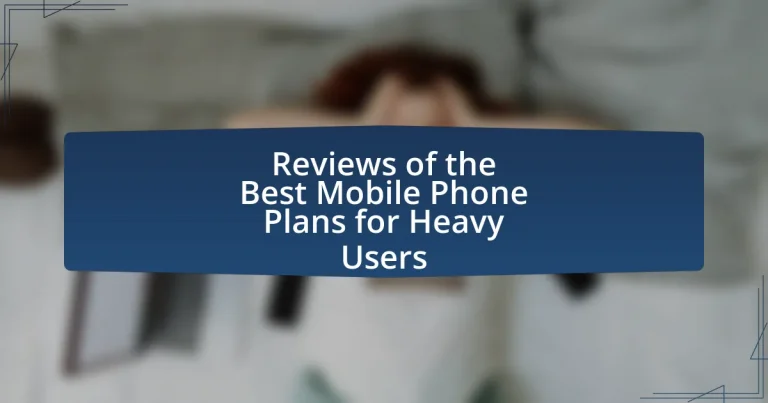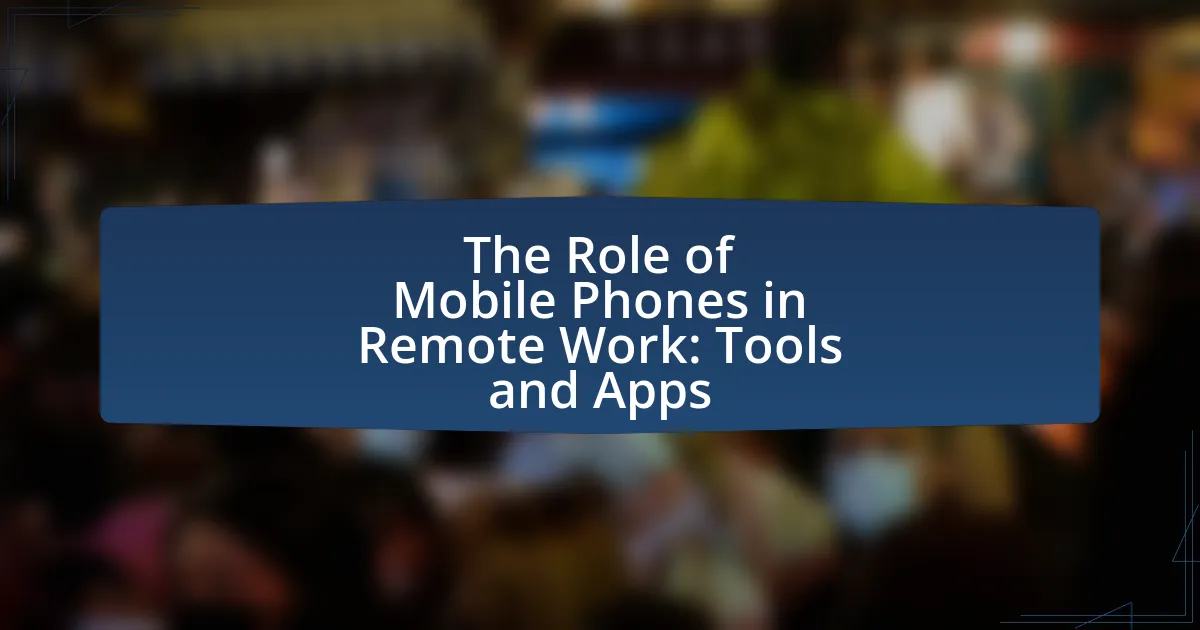The article reviews the best mobile phone plans specifically designed for heavy users, highlighting options that include unlimited data, high-speed internet, and additional features such as international calling. Key plans discussed include Verizon’s Unlimited Plus, AT&T’s Unlimited Elite, and T-Mobile’s Magenta Plus, all catering to extensive data consumption without overage charges. The article also examines how mobile plans accommodate heavy users, the importance of network coverage, and the impact of data limits on user experience. Additionally, it provides insights into pricing structures, customer satisfaction, and future trends in mobile plans, emphasizing the need for careful evaluation of features and costs when selecting a plan.
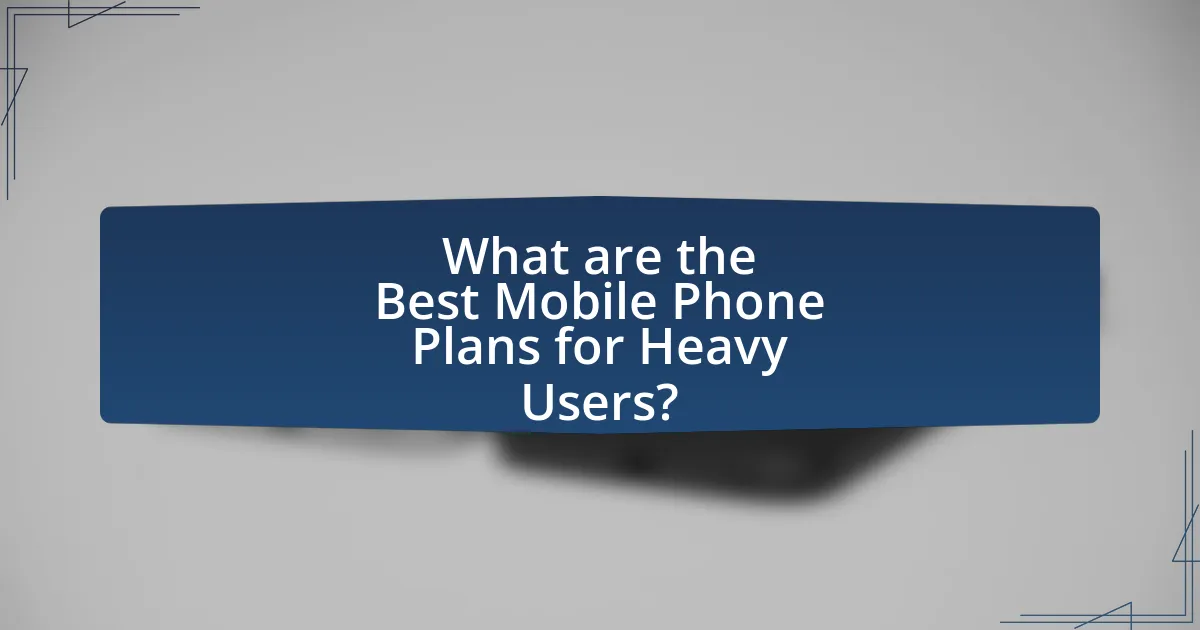
What are the Best Mobile Phone Plans for Heavy Users?
The best mobile phone plans for heavy users typically include unlimited data options, high-speed internet, and additional perks like international calling. For instance, Verizon’s Unlimited Plus plan offers unlimited data with 4K streaming and 20GB of mobile hotspot usage, while AT&T’s Unlimited Elite plan provides similar benefits with HBO Max included. T-Mobile’s Magenta Plus plan also caters to heavy users by offering unlimited data, HD streaming, and 20GB of hotspot data. These plans are designed to accommodate the high data consumption of heavy users, ensuring they have reliable access to services without overage charges.
How do mobile phone plans cater to heavy users?
Mobile phone plans cater to heavy users by offering unlimited data options, higher data caps, and additional features tailored to extensive usage. These plans typically include unlimited talk and text, as well as high-speed data allowances that can accommodate streaming, gaming, and large file downloads without incurring overage fees. For instance, many carriers provide plans with unlimited data at a fixed monthly rate, which is ideal for users who consume large amounts of data. Additionally, some plans offer priority data access during peak times, ensuring that heavy users maintain connectivity even when network congestion occurs.
What features should heavy users look for in a mobile plan?
Heavy users should look for unlimited data, high-speed internet, and robust network coverage in a mobile plan. Unlimited data ensures that users can stream, download, and browse without worrying about overage charges, which is crucial for those who frequently use their devices for data-intensive activities. High-speed internet, often characterized by 4G LTE or 5G capabilities, allows for faster downloads and smoother streaming experiences. Additionally, robust network coverage guarantees reliable service in various locations, minimizing disruptions. According to a report by the Federal Communications Commission, 5G networks can provide speeds up to 100 times faster than 4G, making it an essential feature for heavy users.
How do data limits impact heavy users?
Data limits significantly impact heavy users by restricting their ability to consume large amounts of data, which can lead to throttling or additional charges. Heavy users, who typically engage in activities such as streaming, gaming, and downloading, may find their internet speeds reduced once they exceed their data cap, resulting in slower performance and a diminished user experience. For instance, many mobile plans impose a limit of 5GB to 20GB per month, and exceeding these limits can lead to speeds reduced to as low as 128 Kbps, making it challenging for heavy users to maintain their usual online activities.
What are the top mobile phone plans available for heavy users?
The top mobile phone plans available for heavy users include Verizon’s Unlimited Plus Plan, AT&T’s Unlimited Elite Plan, and T-Mobile’s Magenta Plus Plan. Verizon’s Unlimited Plus Plan offers unlimited data, HD streaming, and 20GB of mobile hotspot data, making it ideal for users who consume large amounts of data. AT&T’s Unlimited Elite Plan provides similar unlimited data, along with 30GB of mobile hotspot data and HD streaming, catering to heavy users’ needs. T-Mobile’s Magenta Plus Plan also features unlimited data, HD streaming, and 20GB of mobile hotspot data, appealing to those who frequently use their phones for streaming and browsing. These plans are designed specifically for heavy users, ensuring they have the necessary data and features to support their usage patterns.
Which providers offer the best unlimited data plans?
Verizon, T-Mobile, and AT&T offer the best unlimited data plans. Verizon’s Unlimited plan provides high-speed data with a robust network, T-Mobile’s Magenta Plus plan includes HD streaming and international data, while AT&T’s Unlimited Elite plan offers premium features like HBO Max and high-definition streaming. These providers are recognized for their extensive coverage, reliable service, and additional perks that cater to heavy users.
What are the pricing structures of these plans?
The pricing structures of mobile phone plans for heavy users typically range from $50 to $100 per month, depending on the data allowance and additional features. For instance, plans offering unlimited data often start around $70, while those with capped data limits may be priced lower, around $50 for 10GB to 20GB of data. Additionally, many providers include features such as mobile hotspot capabilities and international calling, which can affect the overall cost. These pricing tiers are designed to accommodate varying usage patterns, ensuring that heavy users can find a suitable plan that meets their needs.
How do different mobile phone plans compare for heavy users?
Different mobile phone plans for heavy users typically offer varying data limits, pricing structures, and additional features. For instance, unlimited data plans are often favored by heavy users, as they provide unrestricted access without overage fees. Major carriers like Verizon, AT&T, and T-Mobile offer such plans, with prices ranging from $70 to $90 per month.
In contrast, some budget carriers may provide lower-cost options with limited data, which can lead to throttling after a certain usage threshold, making them less suitable for heavy users. According to a 2023 study by J.D. Power, 85% of heavy data users prefer unlimited plans due to the predictability of costs and the avoidance of throttling.
Additionally, heavy users may benefit from plans that include features like mobile hotspot capabilities and international roaming, which are often included in premium plans. Therefore, when comparing mobile phone plans for heavy users, it is crucial to consider data limits, pricing, and additional features to determine the best fit for their usage patterns.
What are the pros and cons of each plan?
The pros and cons of each mobile phone plan for heavy users vary significantly based on features, pricing, and data allowances. For instance, unlimited data plans offer the advantage of no overage fees and the ability to stream and download without restrictions, which is ideal for heavy users. However, these plans often come with higher monthly costs and may include deprioritization during peak times, leading to slower speeds.
On the other hand, limited data plans typically have lower monthly fees and may include rollover data or family sharing options, making them cost-effective for users who can manage their data usage. The downside is the risk of incurring overage charges if the data limit is exceeded, which can lead to unexpected expenses.
In summary, unlimited plans provide freedom and convenience but at a higher cost, while limited plans offer affordability but require careful monitoring of data usage to avoid extra charges.
How do customer reviews reflect user satisfaction?
Customer reviews reflect user satisfaction by providing direct feedback on experiences with products or services. These reviews often include ratings and detailed comments that indicate how well a mobile phone plan meets user needs, such as data speed, customer service, and pricing. For instance, a study by BrightLocal found that 91% of consumers read online reviews to determine the quality of a business, highlighting the importance of customer feedback in assessing satisfaction levels. Additionally, high ratings typically correlate with positive user experiences, while negative reviews often point to specific issues that detract from satisfaction, such as poor network coverage or unexpected fees.
What additional features should heavy users consider?
Heavy users should consider features such as unlimited data, high-speed data options, and international roaming capabilities. Unlimited data ensures that heavy users can stream, download, and browse without worrying about overage charges, which is crucial given that heavy users often exceed standard data limits. High-speed data options, such as 5G access, provide faster internet speeds, enhancing the user experience for activities like video conferencing and gaming. Additionally, international roaming capabilities allow heavy users to maintain connectivity while traveling abroad, which is essential for those who frequently travel for work or leisure. These features are vital for optimizing the mobile experience for heavy users.
How important is network coverage for heavy users?
Network coverage is critically important for heavy users. Reliable and extensive network coverage ensures that heavy users can consistently access data services, make calls, and send messages without interruptions. According to a study by OpenSignal, users in areas with strong network coverage experience 4G LTE speeds that are 50% faster than those in areas with poor coverage, highlighting the direct impact of coverage on user experience. Additionally, heavy users often rely on streaming services, video calls, and online gaming, which require stable connections; thus, inadequate coverage can lead to buffering and dropped connections, significantly affecting their overall satisfaction with mobile services.
What role do international roaming options play?
International roaming options enable mobile users to access voice, text, and data services while traveling outside their home country. These options are crucial for heavy users who require continuous connectivity for work, communication, and navigation while abroad. According to a report by the GSMA, 70% of travelers rely on their mobile devices for essential services during international trips, highlighting the importance of having reliable roaming plans.
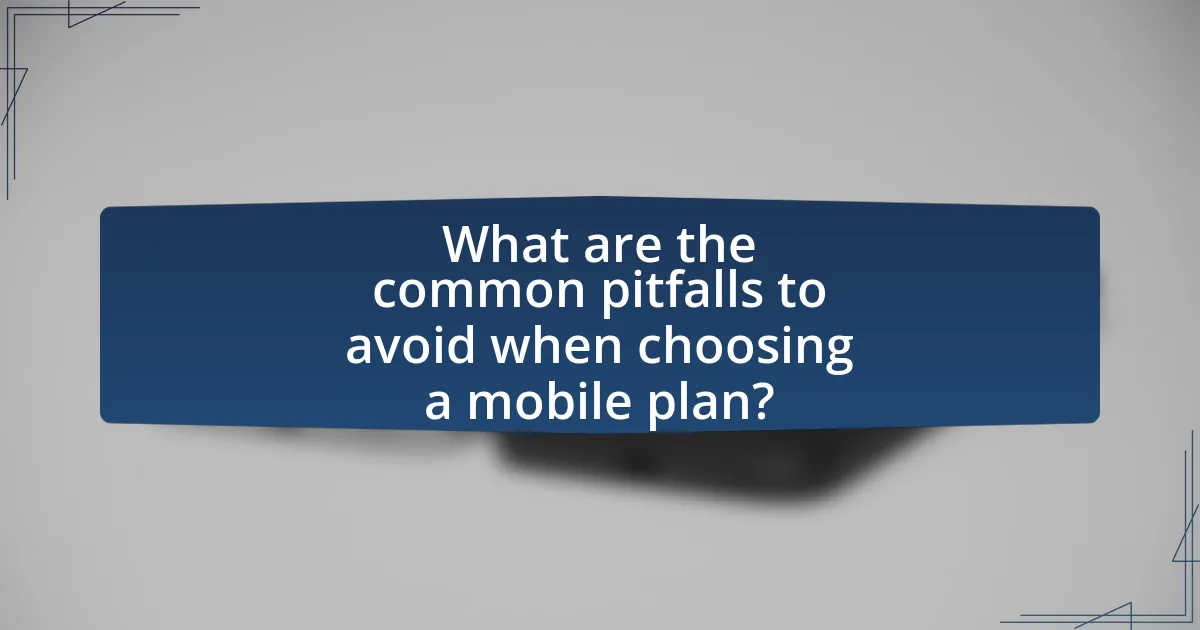
What are the common pitfalls to avoid when choosing a mobile plan?
Common pitfalls to avoid when choosing a mobile plan include overlooking the total cost, failing to assess data needs, and ignoring contract terms. Many consumers focus solely on the monthly fee without considering additional charges such as activation fees, taxes, and overage costs, which can significantly increase the total expense. Additionally, users often underestimate their data consumption, leading to unexpected overage fees or throttled speeds. Lastly, not reviewing the contract terms can result in being locked into unfavorable conditions, such as high cancellation fees or limited flexibility in plan changes. These factors can lead to dissatisfaction and financial strain, making it essential to evaluate all aspects of a mobile plan thoroughly.
What mistakes do heavy users make when selecting a plan?
Heavy users often make the mistake of underestimating their actual data consumption needs when selecting a mobile plan. This leads to choosing plans with insufficient data allowances, resulting in overage charges or throttled speeds. According to a study by the Pew Research Center, 81% of heavy data users reported exceeding their plan limits at least once, highlighting the importance of accurately assessing usage patterns before making a selection. Additionally, heavy users frequently overlook the benefits of unlimited plans, which can provide better value and peace of mind compared to limited data options.
How can hidden fees affect overall costs?
Hidden fees can significantly increase overall costs by adding unexpected charges to the initial price of a mobile phone plan. For instance, a plan advertised at $50 per month may include hidden fees such as activation fees, administrative charges, or taxes that can raise the total monthly cost to $70 or more. According to a study by the Federal Communications Commission, nearly 30% of consumers reported being surprised by additional fees on their bills, which can lead to budget overruns and dissatisfaction with the service. Therefore, understanding and identifying hidden fees is crucial for consumers to accurately assess the true cost of mobile phone plans.
What should users know about contract terms and conditions?
Users should know that contract terms and conditions outline the rights and responsibilities of both parties involved in a mobile phone plan. These documents typically include details such as the duration of the contract, monthly fees, data limits, penalties for early termination, and any additional charges that may apply. Understanding these terms is crucial, as they can significantly impact the overall cost and usability of the mobile service. For instance, a study by the Federal Communications Commission indicates that consumers often overlook early termination fees, which can range from $150 to $350, affecting their decision-making when switching providers.
How can heavy users maximize their mobile plan benefits?
Heavy users can maximize their mobile plan benefits by selecting plans that offer unlimited data, prioritizing family or group plans for shared savings, and utilizing mobile hotspots for additional connectivity. Unlimited data plans cater specifically to heavy usage, allowing users to stream, download, and browse without worrying about overage fees. Family or group plans often provide significant discounts per line, making them cost-effective for multiple users. Additionally, leveraging mobile hotspots can extend internet access to other devices, enhancing overall utility. According to a 2022 report by the Federal Communications Commission, consumers can save up to 30% on their monthly bills by opting for shared plans, reinforcing the financial advantages of these strategies.
What tips can help users manage their data usage effectively?
To manage data usage effectively, users should monitor their data consumption regularly. Utilizing built-in data tracking features on smartphones allows users to see which apps consume the most data, enabling them to adjust usage accordingly. Additionally, users can limit background data for apps, ensuring that they only use data when actively in use. Setting data usage alerts can also help users stay within their limits by notifying them when they approach their data cap. According to a study by the Pew Research Center, 90% of smartphone users are unaware of their data usage, highlighting the importance of proactive management strategies.
How can users take advantage of promotional offers?
Users can take advantage of promotional offers by actively researching and comparing mobile phone plans that feature limited-time discounts or bonuses. Many service providers offer promotional deals that can include reduced monthly rates, additional data, or free devices for new customers. For instance, a study by the Federal Communications Commission indicates that consumers who compare plans can save an average of 20% on their monthly bills. By staying informed about current promotions through provider websites, social media, and comparison tools, users can maximize their savings and select the best plan suited for heavy usage.
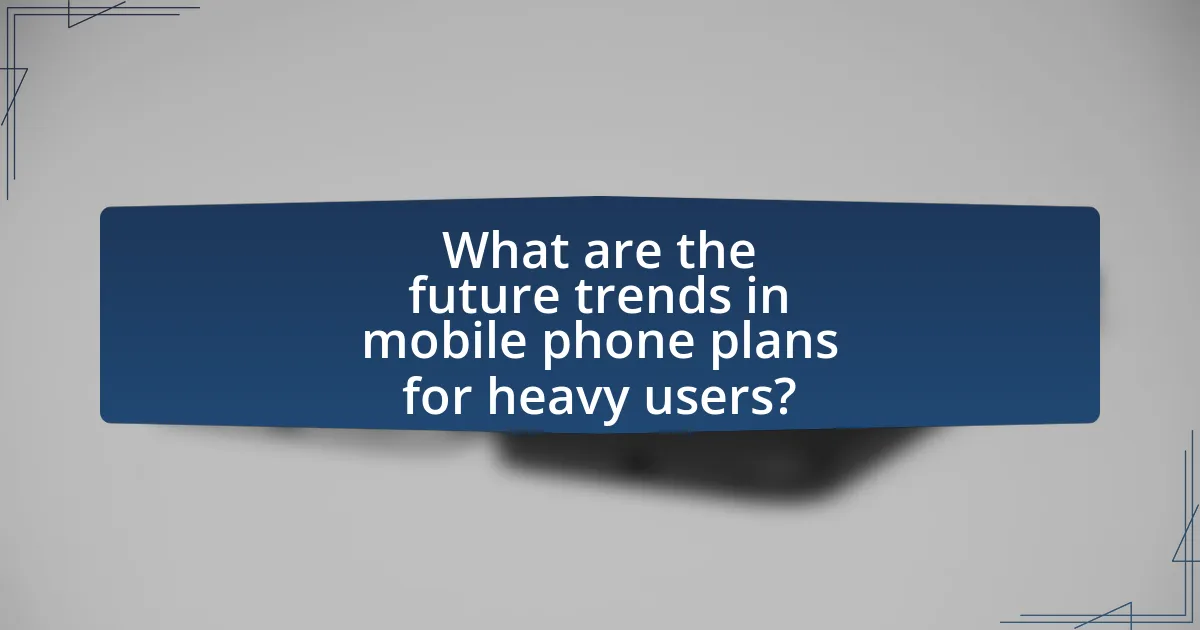
What are the future trends in mobile phone plans for heavy users?
Future trends in mobile phone plans for heavy users include increased data allowances, flexible pricing models, and enhanced network capabilities. As consumer demand for data-intensive applications rises, mobile carriers are likely to offer plans with unlimited or significantly higher data caps to accommodate streaming, gaming, and other high-bandwidth activities. Additionally, the introduction of 5G technology is expected to drive competition among providers, leading to more innovative pricing structures, such as pay-per-use data options or family-sharing plans that allow multiple users to pool their data. According to a report by the GSMA, the global mobile data traffic is projected to grow by 26% annually, indicating a strong market need for plans tailored to heavy users.
How is the mobile industry evolving to meet heavy user demands?
The mobile industry is evolving to meet heavy user demands by increasing data allowances, enhancing network speeds, and offering more flexible pricing plans. Major carriers are now providing unlimited data options and high-speed 5G networks to accommodate the growing consumption of streaming services, gaming, and social media. For instance, as of 2023, Verizon and AT&T have rolled out plans that include unlimited data with no deprioritization during congestion, addressing the needs of users who rely heavily on mobile data. Additionally, the introduction of family plans and customizable packages allows users to tailor their services according to their specific usage patterns, further enhancing customer satisfaction and retention.
What innovations are being introduced in mobile plans?
Innovations in mobile plans include the introduction of 5G connectivity, flexible data options, and family plan discounts. 5G technology enhances speed and reliability, allowing users to experience faster downloads and improved streaming quality. Flexible data options enable users to customize their data limits based on usage patterns, which can lead to cost savings. Additionally, many carriers are now offering family plan discounts that provide lower rates for multiple lines, making it more economical for heavy users. These innovations are designed to meet the evolving needs of consumers, particularly those who rely heavily on mobile data.
How might 5G technology impact mobile plans for heavy users?
5G technology is likely to lead to more flexible and higher-capacity mobile plans for heavy users. With 5G’s increased data speeds and lower latency, mobile carriers can offer plans that accommodate higher data usage without throttling or overage fees. For instance, 5G networks can support data-intensive applications such as streaming high-definition video and online gaming more efficiently, which is crucial for heavy users. As a result, carriers may introduce unlimited data plans or significantly increase data caps, reflecting the enhanced capabilities of 5G infrastructure. This shift is supported by industry trends, as major carriers have already begun to roll out 5G plans that cater specifically to users with high data demands, indicating a market response to the technological advancements of 5G.
What practical tips can heavy users follow when choosing a mobile plan?
Heavy users should prioritize mobile plans that offer unlimited data or high data caps to accommodate their usage needs. Many providers, such as Verizon and AT&T, offer plans specifically designed for heavy data consumption, often including features like mobile hotspot capabilities and no throttling after reaching a certain data limit. Additionally, heavy users should compare network coverage and speeds in their area, as performance can vary significantly between carriers. Research indicates that users in urban areas may benefit from plans with higher data speeds, while rural users should focus on coverage reliability. Finally, reviewing customer service ratings and contract terms can help ensure a satisfactory experience, as heavy users may require more support and flexibility.
How can users assess their actual data needs?
Users can assess their actual data needs by analyzing their monthly data usage patterns and identifying specific activities that consume data. By reviewing their past mobile bills or using built-in data tracking features on their devices, users can quantify how much data they typically use for activities such as streaming, browsing, and social media. According to a study by the Pew Research Center, heavy mobile users often consume between 5 to 20 GB of data per month, depending on their usage habits. This analysis allows users to make informed decisions when selecting mobile phone plans that align with their actual data requirements.
What resources are available for comparing mobile plans?
Resources available for comparing mobile plans include online comparison websites, mobile carrier websites, and consumer review platforms. Online comparison websites like WhistleOut and Wirefly allow users to filter plans based on specific needs such as data limits, pricing, and contract terms. Mobile carrier websites provide detailed information about their offerings, including promotions and coverage maps. Consumer review platforms like Trustpilot and Consumer Reports offer user-generated reviews and ratings, helping potential customers gauge the quality of service and customer satisfaction. These resources collectively enable users to make informed decisions based on comprehensive data and real user experiences.
